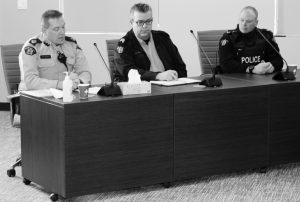RCMP holds virtual town hall to share information
By Rob Vogt
Local Press Writer
It was a chance to engage the community, share information, and answer any questions people had.
The Claresholm and Nanton RCMP held a virtual town hall on March 10, livestreaming from the Claresholm town council chambers.
Sergeant Rob Harms, commander of both detachments, opened by saying he wanted the event to be a two-way dialogue, and these town halls would be happening every two to three months.
He then went over some statistics.
Over the last three months, the Claresholm detachment laid 130 charges, including 59 under the Criminal Code, 62 under traffic, and nine other charges.
The Claresholm detachment had a total 1,844 files/investigations in 2021.
The top categories for crime in 2021 were property crimes with a total of 304; motor vehicle collisions with 160; and persons crimes with 97, which includes assault, sexual assault, robbery, harassment, uttering threats and more.
A crime gauge, comparing January to December of 2021 to 2020 revealed persons crimes down eight per cent; property crimes up five per cent; and other Criminal Code offences up five per cent; for a two percent increase in total Criminal Code offences.
However, break and enter was down 22 per cent with eight fewer instances, and theft under $5,000 was down 30 per cent with 32 fewer instances. There was also a 110 percent increase in thefts of motor vehicles with 11 more.
Priorities
Constable Tom Nairn then discussed the detachment’s priorities, which are traffic safety, specifically school and playground patrols, and intersection violations; police/community relations, specifically foot patrols; enhanced shifts; and presentations; and crime reduction, specifically offender checks; media campaigns; and decreasing thefts from motor vehicles.
Harms said over the past three months they went from meeting or exceeding 50 percent of the priorities to 87 per cent. The only one that was below target was intersection violations.
Harms then introduced some specific initiatives the detachments have been doing.
Risk reduction
One was risk reduction in the schools.
“It changes the youth and the community for good,” Harms said.
Corporal Dalyn Orsten explained he started the program seven or eight years ago with the high school, fire department, and Alberta Health Services, because they thought a program for youth was needed.
The program teaches students about risky behaviour and its consequences.
“It really kind of took off from there,” Orsten said.
In the past it started with an actual vehicle that has been in an accident, and takes students through the whole process of the police arriving and detaining an impaired driver. At the same time an injured passenger is taken to the hospital, dies and is taken away by the funeral home.
Now, a scenario is done in the morning, with an afternoon of sessions on a variety of topics from mental health and first aid, to distracted driving and more.
They also meet once per month with Grade 12 students.
Orsten said another reason to start the program was that, because Claresholm is an hour from Calgary and Lethbridge, it was hard to get someone to come to make a presentation.
“In the end, that was the best decision we made,” he said.
“I can’t say enough about this program,” Harms said.
Detachment services
Katherine Foerster, the detachment assistant in Nanton, explained what services the detachment can provide.
Harms described the assistants as the unsung heroes of the RCMP.
Foerster said they are in the office and assist with all paper work. They also prepare court documents; are the front counter staff; answer phones; and assist the public with everything from criminal record checks and civilian finger prints to statements on vehicle collisions.
“We’re always available to you,” she said. “We will assist in any way we can.”
“We couldn’t do what we do without you,” Harms said.
Staff Sergeant Tim Kelly, who looks after several detachments in Southern Alberta, was on hand as well.
“From what I’ve seen, Rob and his crew are doing a great job,” he said. “I really appreciate his hard work and all his people’s hard work.
Question and answer
There was also a time to answer questions e-mailed in by the public.
Why do night response times take up to 40 minutes?
Harms said they have officers day and night, covering a large geographic area.
Several factors determine response time too. Is it urgent or did the event happen yesterday or last night? Where are the officers in relation to the call? What are they doing when the call comes in?
Harms observed some people want officers right away.
“Sometimes the officers have to prioritize,” he said.
Do the officers live in the community?
“Everyone is local to the detachment area,” Harms responded.
Do officers work past 10 p.m.?
“Our officers work day and night,” Harms said, adding he never reveals the exact schedule.
Will the RCMP have barbecues at the detachment as they used to?
Harms said the pandemic, and the limit on public gatherings to prevent the spread of the COVID-19 virus, changed how the police do community events.
He suspected they would happen again though.
Orsten added members of the RCMP and EMS in the past have cooked breakfast at the start of the school year at West Meadow Elementary School.

